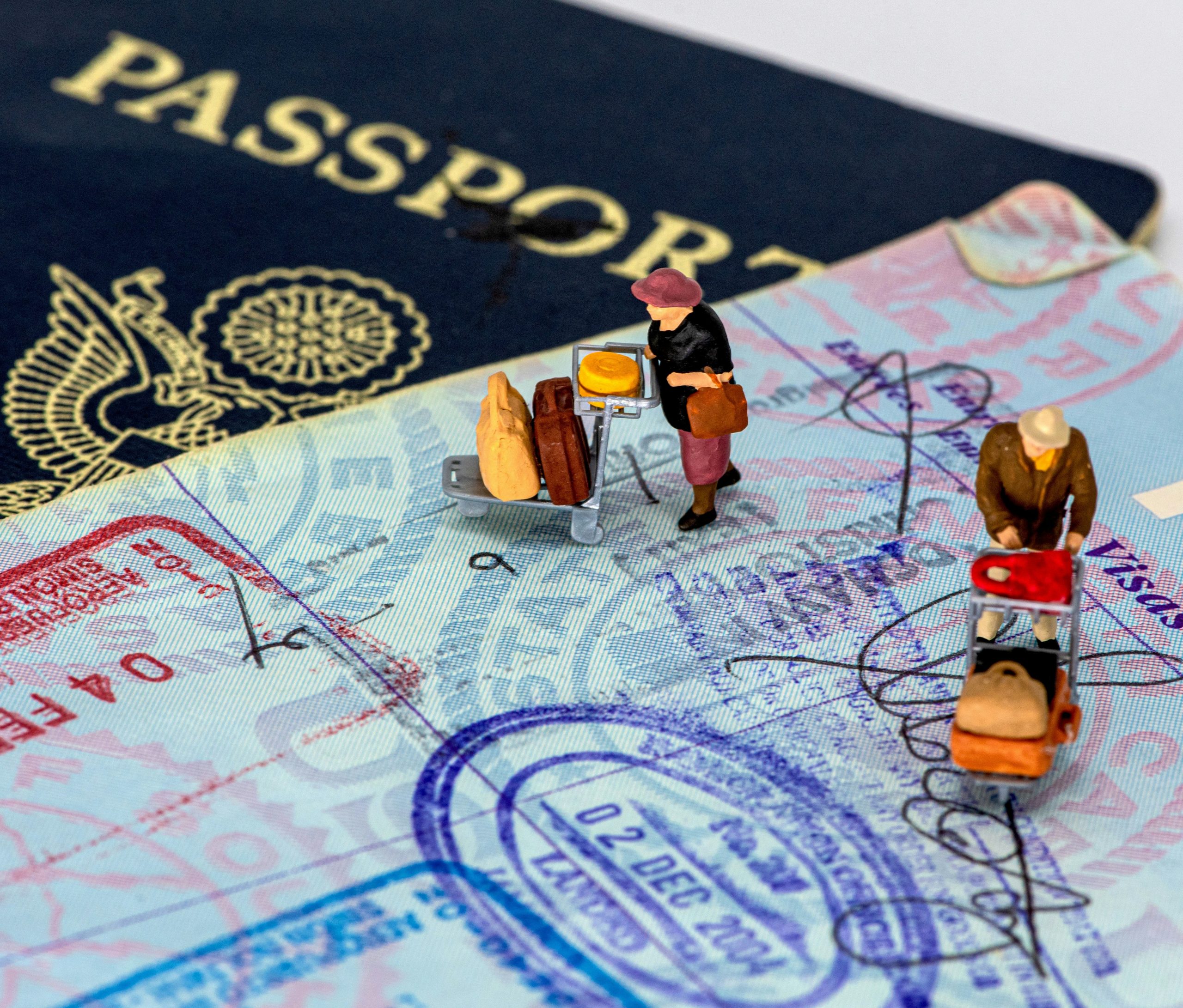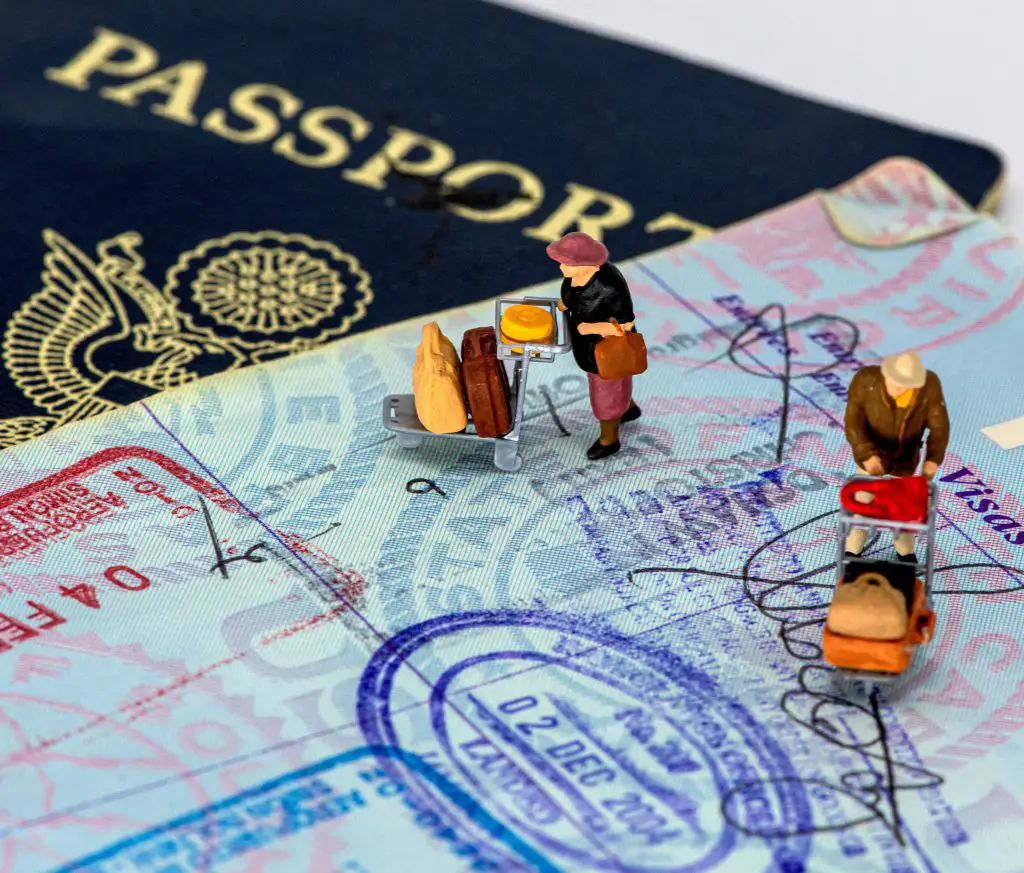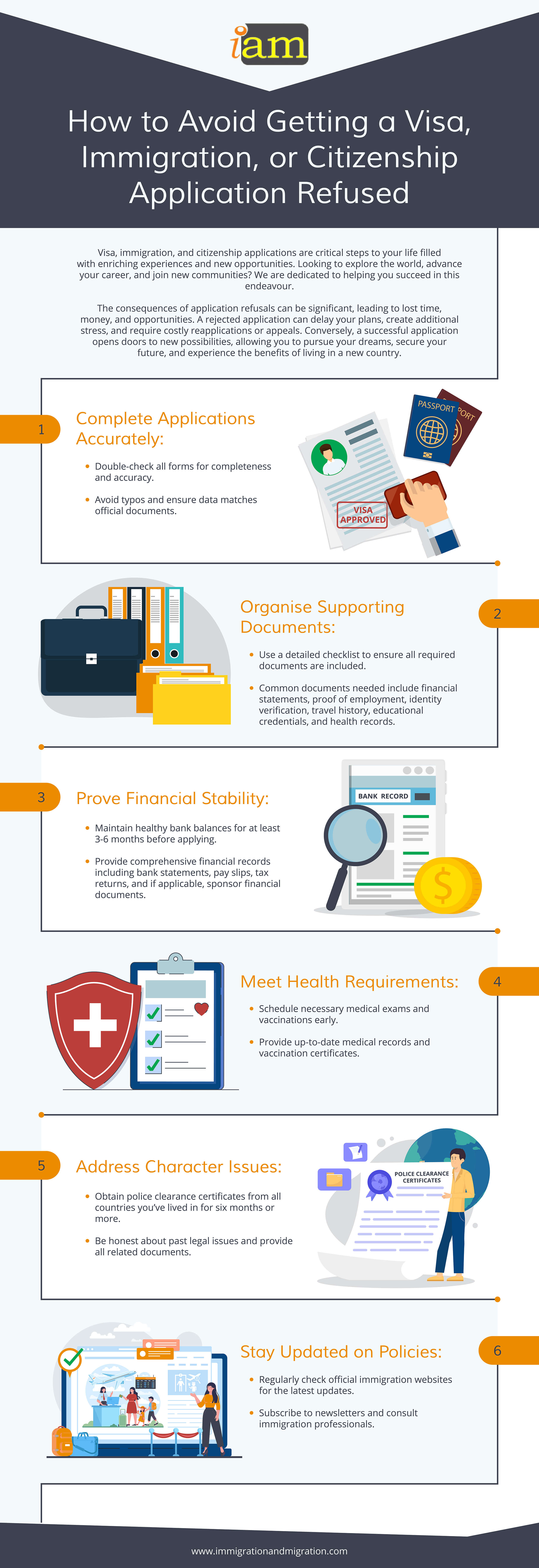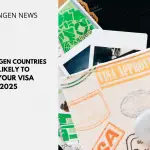How to Avoid Getting a Visa, Immigration, or Citizenship Application Refused

- Understanding Common Reasons for Refusals
- Recent Changes in Visa Policies
- Detailed Explanations and Examples
- Actionable Tips to Avoid Refusals
- Dealing with a Refusal
- FAQs
Visa, immigration, and citizenship applications are critical steps to your life filled with enriching experiences and new opportunities. Looking to explore the world, advance your career, and join new communities? We are dedicated to helping you succeed in this endeavour.
The consequences of application refusals can be significant, leading to lost time, money, and opportunities. A rejected application can delay your plans, create additional stress, and require costly reapplications or appeals. Conversely, a successful application opens doors to new possibilities, allowing you to pursue your dreams, secure your future, and experience the benefits of living in a new country.
Practical Actions for Success:
- Complete Applications Accurately: Double-check all forms for accuracy.
- Organise Supporting Documents: Use a checklist to ensure all required documents are included. Check out our Application Check & Send Service to have your application checked by an immigration lawyer.
- Prove Financial Stability: Provide clear and comprehensive financial records.
- Meet Health Requirements: Schedule medical exams early and keep records.
- Address Character Issues: Be transparent and provide necessary certificates.
- Stay Updated on Policies: Regularly check immigration websites for the latest updates.
This guide aims to provide practical advice and actionable tips to help you avoid common mistakes to navigate the application process with confidence.
Understanding Common Reasons for Refusals

Incomplete or Incorrect Applications
One of the most common reasons for visa, immigration, and citizenship application refusals is submitting incomplete or incorrect applications. This often happens due to various factors like missing information, incorrect data entry, or failure to provide required documents.
Detailed Explanation of Common Mistakes:
- Missing Information: Leaving out crucial details like personal information, travel history, or employment details is one of the main causes of delays and at worst; refusals.
- Incorrect Data Entry: Simple typos or data that doesn't match your official documents can cause significant issues.
- Lack of Required Documents: Not submitting necessary supporting documents like financial statements, proof of employment, or identity verification.
Actionable Tips:
- Double-Check Forms: Review your application forms for completeness and accuracy before submission. Pay close attention to every field and ensure all required information is filled out correctly.
- Seek Professional Help: Consider consulting with an immigration expert or lawyer like one of our team at IaM. We can review your application, help you gather the correct documents, and ensure everything is in order before submission.
By meticulously preparing your application and seeking professional assistance when needed, you can significantly reduce the risk of refusal due to incomplete or incorrect submissions. This proactive approach not only enhances your chances of success but also saves time and stress in the long run.

Lack of Supporting Documents
Not providing all the necessary supporting documents is another common reason for visa, immigration, and citizenship application refusals. Each type of application has specific document requirements that must be met to avoid delays or rejections.
Examples of Required Documents:
Even if not requested, depending on your type of application, every visa application should contain the following documents.
- Financial Statements: Bank statements, tax returns, and proof of income to demonstrate financial stability.
- Proof of Employment: Employment letters, pay slips, and contracts.
- Identity Verification: Passports, birth certificates, and national IDs.
- Travel History: Previous visas, entry/exit stamps, and travel itineraries.
- Educational Credentials: Diplomas, transcripts, and certificates. These are for education or work-type applications.
- Health Records: Medical examinations and vaccination records. These are for applications for longer periods of travel/stay.
Actionable Tips:
- Create or Get a Detailed Checklist: Before you start your application, make a comprehensive checklist of all required documents. This ensures you don’t miss any critical paperwork. Work off that checklist.
- Organise Documents Beforehand: Gather all your documents well in advance of your application deadline. Organise them in a logical order that follows the document checklist provided to you and ensure they are up-to-date and correctly certified if necessary.

Insufficient Financial Proof
Insufficient financial proof is a common reason for visa application refusals. Governments want to ensure you have the means to support yourself during your stay and won’t become a financial burden on the state. Some even require that you have private medical insurance to make sure you are covered for your trip.
Explanation of Financial Requirements:
The financial requirements will depend on the visa type you are making and to which country you are applying. For example;
- France (Visit Visa): You need to show £95 per day (~$120 USD).
- Spain (Visit Visa): You need to show £70 per day (~$88 USD).
- UK (Visit Visa): No specified amount, but you must show funds for flights, hotels, and spending money etc.
- UK (Work Visa): £1270 for the first month (~$1600 USD).
- UK (Student Visa): Maintenance requirements over £9000 (~$11,500 USD) for an entry clearance application.
- USA (Tourist Visa): No fixed amount, but sufficient funds for your stay, typically around $50-100 per day plus accommodation and travel expenses.
- Canada (Visitor Visa): Generally, you need to show $100 CAD per day (~£60 GBP) plus funds for accommodation.
- Australia (Visitor Visa): Around AUD 5,000 (~£2,700 GBP) for a 3-month stay, plus return airfare.
- New Zealand (Visitor Visa): NZD 1,000 per month (~£500 GBP), or NZD 400 per month (~£200 GBP) if you’ve pre-paid accommodation.
Duration of Funds:
- Funds should be in your account for at least 3 to 6 months before your application. Do try to provide more than the required minimums.
Income Proof:
- You need to demonstrate a stable source of income through recent pay slips, tax returns, or employment letters. The more documents that support this, the better.
Sponsor Information:
- If someone else is supporting you financially, provide their financial documents and a sponsorship letter. You should also include their ID documents (passport and residency proof, if applicable).
Actionable Tips:
- Maintain Healthy Bank Balances: Ensure your bank statements reflect a stable and sufficient balance over several months before your application. The more money you have, the better your chances are for success. Additionally, it may give you access to multiple entry visas.
- Collect Income Proof: Gather recent pay slips, tax returns, and an employment verification letter to show consistent income.
- Document Sponsorship: If you have a sponsor, obtain a detailed sponsorship letter along with the financial documents listed above.
- Duration and Consistency: Ensure your funds have been in your account for at least 3 to 6 months. Even where the requirement is 3-6 months, provide 6 months of bank statements to demonstrate financial stability.

Failure to Meet Health Requirements
Ensuring you meet health requirements is crucial for your immigration applications. Many countries have specific health standards to prevent the spread of diseases and ensure applicants won't burden their healthcare systems.
Overview of Medical Requirements:
- General Health Checks: Many countries require a general health check-up to confirm you don't have any contagious diseases.
- Specific Tests: Depending on the country, you might need tests for tuberculosis (TB), HIV, or other specific diseases.
- Vaccination Records: Up-to-date vaccination records may be required.
Actionable Tips:
- Get Medical Check-Ups in Advance: Schedule a comprehensive health check-up well in advance of your application appointment. This gives you time to address any issues that may arise.
- Contact Approved Medical Centres: Visit clinics or hospitals approved by the embassy or consulate of the country you're applying to. Check their websites for a list of approved medical practitioners.
- Required Tests and Vaccinations: Research and complete the necessary tests and vaccinations. For instance:
- TB Test: Commonly required for countries like the UK, Canada, and Australia.
- HIV Test: Sometimes required for long-term visas.
- Vaccinations: For visit-type applications, ensure you're up-to-date on vaccinations like MMR (measles, mumps, and rubella), hepatitis, and others as specified by the destination country.
- Organise Medical Documents: Ensure all medical reports and vaccination records are properly documented and translated if necessary.

Character Issues
Character issues are another common reason for visa, immigration, and citizenship application refusals. These issues typically relate to your past behaviour and any criminal history.
What Constitutes Character Issues?
- Criminal History: Any past convictions or ongoing investigations.
- False Information: Providing false information on your application.
- Security Concerns: Associations with groups or activities deemed a security threat.
Actionable Tips:
- Provide Police Clearance Certificates: Obtain police clearance certificates from every country where you’ve lived for six months or more. These certificates verify that you have no criminal record.
- Where to Get Certificates: Contact local police departments or national law enforcement agencies. Many countries also have online portals where you can request these documents. Check out this guide on how to get your police clearance certificate
- Be Honest About Past Issues: Fully disclose any past legal issues or convictions. Honesty is crucial, as undisclosed information can lead to automatic refusal.
- Documentation: Gather and organise all related documents, such as court records or letters of explanation for minor offences.
By proactively addressing character issues and providing all necessary documentation, you can strengthen your application and demonstrate your suitability to immigration authorities.

Recent Changes in Visa Policies
Staying informed about recent changes in visa policies will give you a headstart for a successful application. Several key countries have updated their policies, impacting visa, immigration, and citizenship applications.
Summary of Recent Policy Changes:
- UK: Introduction of the Points-Based Immigration System, affecting work and student visas. Increased scrutiny on financial and English language requirements.
- USA: Changes to the H-1B visa process, including lottery system adjustments and higher wage requirements.
- Canada: Updates to Express Entry and Provincial Nominee Programs, emphasising applicants with specific skills and job offers.
Examples of New Reasons for Rejections:
- UK: Failure to meet the new points criteria.
- USA: Inadequate wage documentation for H-1B applicants.
- Canada: Lack of alignment with updated skill shortage lists.
Actionable Tips:
- Stay Updated with Official Immigration Websites: Regularly visit government websites for the latest updates.
- UK: UK Government Immigration
- USA: USCIS
- Canada: Immigration, Refugees and Citizenship Canada
- Australia: Immigration and Citizenship
- New Zealand: Immigration New Zealand
- Subscribe to Newsletters: Sign up for newsletters from official immigration bodies and trusted immigration law firms to receive timely updates.
- Consult Professionals: Regularly consult with immigration experts to ensure your application complies with the latest requirements.
Detailed Explanations and Examples
Example 1: Student Visa Refusals
Common Issues and How to Avoid Them:
- Insufficient Financial Proof: Ensure you meet the maintenance requirements, such as showing over £9,000 (~$11,500 USD) for the UK.
- Lack of Genuine Intent: Demonstrate your genuine intention to study, including a detailed study plan and how it fits into your career goals.
- Missing Documents: Provide all required documents like acceptance letters, transcripts, and financial statements.
Actionable Tips:
- Prepare a strong personal statement explaining your study intentions.
- Double-check the specific financial requirements for your destination.
- Use a checklist to ensure all documents are complete and up-to-date.
Example 2: Work Visa Refusal
Common Pitfalls and Preventive Measures:
- Job Offer Issues: Ensure your job offer meets all regulatory requirements, such as salary thresholds.
- Insufficient Skills Proof: Provide comprehensive evidence of your qualifications and experience.
- Incorrect Documentation: Submit all necessary documents, including job contracts and letters from your employer.
Actionable Tips:
- Verify that your job offer complies with the host country’s regulations.
- Collect and organise all professional qualifications and experience documents.
- Regularly consult with your employer to ensure all paperwork is accurate and complete.
Example 3: Citizenship Application Refusal
Detailed Case Studies and Solutions:
- Case Study 1: Insufficient Residency Period
- Issue: The application was rejected due to a miscalculation of the residency period.
- Solution: Reapply after meeting the exact residency requirements, and keep a detailed travel log.
- Case Study 2: Character Concerns
- Issue: The application was refused due to a past minor offence.
- Solution: Provide a detailed explanation and character references to support your case. Alternatively, apply after the offense lapses to be declared.
Actionable Tips:
- Keep thorough records of your residency period, including travel dates.
- Be honest about any past issues and provide comprehensive supporting documentation.
- Seek legal advice to strengthen your application.

Actionable Tips to Avoid Refusals
Pre-Application Checklist
Comprehensive List of What to Prepare Before Applying:
- Personal identification documents (passport, birth certificate).
- Financial statements and proof of funds.
- Employment or study offer letters.
- Health check and vaccination records.
- Police clearance certificates.
- Completed application forms.
Actionable Tip:
Create a detailed checklist tailored to your specific visa requirements to ensure you have all the necessary documents before applying.
Consulting with Professionals
Benefits of Consulting Immigration Lawyers:
- Expertise in navigating complex immigration laws.
- Assistance with preparing and reviewing your application.
- Increased chances of approval due to professional guidance.
Actionable Tip:
Schedule a consultation with a reputable immigration lawyer to review your application and address any potential issues.
Using Technology
Tools and Apps to Keep Track of Your Application:
- Use online portals like the government for application tracking.
- Download apps like My Visa Tracker (for the USA) to monitor the status of your application.
- Set reminders for key deadlines and document submissions.
Actionable Tip:
Utilise technology to stay organised and ensure you never miss an important step or deadline in your application process.
Double-Checking Applications
The Importance of Reviewing Applications Thoroughly:
- Ensure all information is accurate and complete.
- Verify that all required documents are attached.
- Avoid simple errors that could lead to a refusal.
Actionable Tip:
Review your entire application multiple times and consider having a trusted friend or professional double-check it for you.
Dealing with a Refusal
Understanding the Refusal Letter
How to Interpret the Reasons Given:
- Detailed Review: Carefully read the refusal letter to understand the specific reasons for the denial.
- Common Reasons: These can include insufficient documentation, unmet financial requirements, or incomplete information.
Actionable Tip:
Make a list of the reasons provided and cross-reference them with your application to identify any gaps or mistakes.
Appeal Process
Step-by-Step Guide on How to Appeal a Refusal:
- Review Appeal Rights: Check if you have the right to appeal the decision.
- Gather Evidence: Collect any additional documents or corrections needed.
- Submit Appeal: Follow the instructions provided in the refusal letter to file your appeal within the given timeframe. Remember, some application time limits are 14, 28, and 40 days.
- Seek Legal Advice: Consider consulting with an immigration lawyer for assistance.
Actionable Tip:
Prepare a comprehensive appeal letter addressing each reason for refusal and providing supporting evidence.
Reapplication Tips
Best Practices for Reapplying After a Refusal:
- Address Issues: Ensure all previously mentioned issues are resolved.
- Update Documents: Provide the most current and accurate documents.
- Strengthen Application: Add any additional information that could support your case.
Actionable Tip:
Before reapplying, review your entire application with a professional to ensure all aspects are thoroughly covered and correctly documented.

FAQs
What are the most common reasons for visa refusals?
Common reasons include incomplete or incorrect applications, lack of supporting documents, insufficient financial proof, failure to meet health or character requirements, and discrepancies in the information provided.
How can I ensure my application is complete?
Use a detailed checklist tailored to your visa type, double-check all forms, and ensure all required documents are included and up-to-date. Consult an immigration professional like IaM for a thorough review.
What should I do if my visa application is rejected?
Carefully review the refusal letter to understand the reasons. Consider appealing if you have the right, or address the issues and reapply. Consulting an immigration lawyer can provide valuable guidance.
How do recent policy changes affect my application?
Stay informed by regularly checking official immigration websites and subscribing to newsletters. Recent changes can affect eligibility criteria, documentation requirements, and processing times
Can I reapply after a visa refusal?
Yes, you can reapply after a refusal. Ensure you address the reasons for the initial rejection, update your documents, and thoroughly review your application before resubmitting.
What financial documents are required?
Typically, you need bank statements, pay slips, tax returns, and proof of financial support. Specific requirements vary by visa type and country, so check the official guidelines.
How do I prove my ties to my home country?
Provide evidence such as employment letters, property ownership, family connections, and commitments that demonstrate your intention to return to your home country after your stay.
Are medical exams required for all visa types?
Not all visa types require medical exams, but many do, especially long-term visas. Check the specific health requirements for your visa and complete any necessary medical exams in advance.
How can I avoid common mistakes in my application?
Double-check all information, use a checklist, gather all required documents, and seek professional assistance. Reviewing your application multiple times can help catch errors.
What are the steps to appeal a visa refusal?
Review the refusal letter for appeal instructions, gather additional evidence or corrected documents, submit your appeal within the given timeframe, and consider seeking legal advice to strengthen your case.
- UK Aims to Attract Global Talent with Easier Visa Routes - 29 June 2025
- France Strikes Again: What Travellers Need to Know About July Flight Disruptions - 28 June 2025
- EU Reforms Hand Luggage Fees - 27 June 2025











